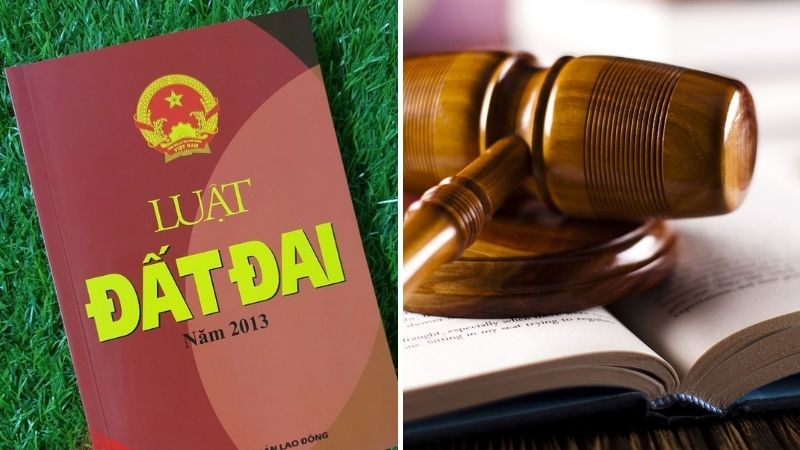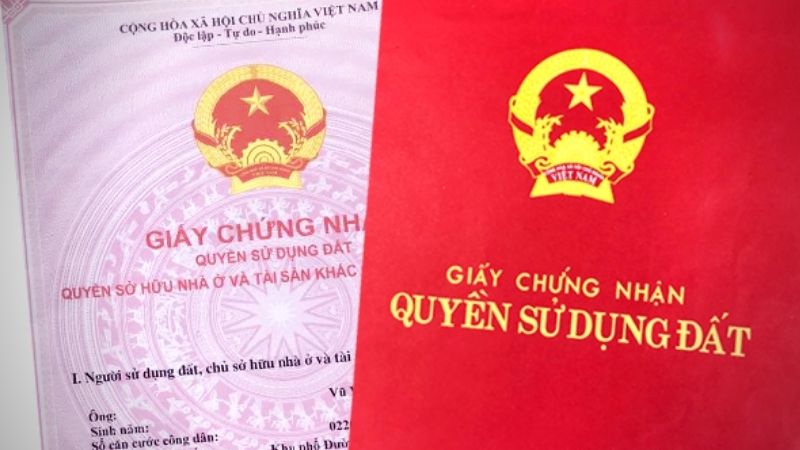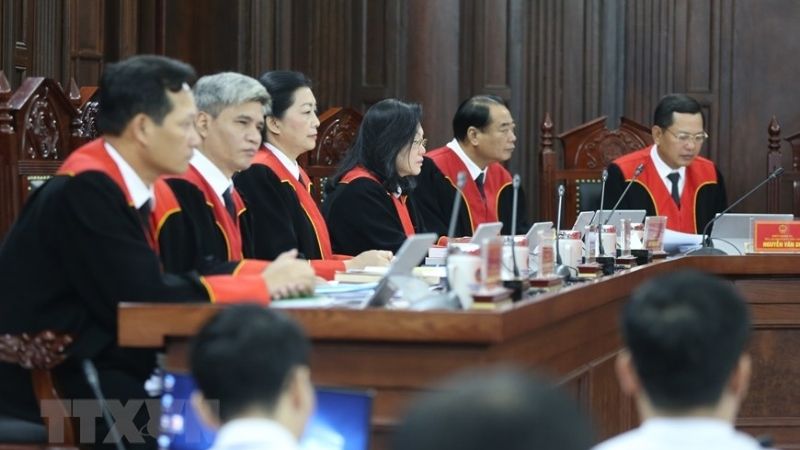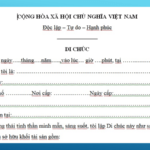The inheritance procedure for land and housing use rights is relatively complicated and involves several steps. Let’s explore the latest regulations on inheritance procedures for land and housing use rights in 2022!
1 Conditions for Inheriting Land and Housing Rights
According to Clause 1, Article 188 of the 2013 Land Law, the conditions for inheriting land and housing rights are as follows:
“1. Land users are entitled to transfer, assign, lease, sublease, inherit, donate, mortgage land use rights, and contribute capital with land use rights when meeting the following conditions:
a) Possess a Certificate of Land Use Rights, except for cases prescribed in Clause 3, Article 186 and cases of inheritance prescribed in Clause 1, Article 168 of this Law;
b) The land is not subject to any dispute;
c) The land use rights are not seized for enforcement of court judgments;
d) The land is within the duration of land use.”
 Conditions for inheriting land and housing rights as stipulated in the Land Law
Conditions for inheriting land and housing rights as stipulated in the Land Law
To better understand the above regulations and ensure the rights of the heirs, here are some legal bases:
Point c, Clause 3, Article 167 of the 2013 Land Law stipulates: “The document on inheritance of land use rights, land use rights, and assets attached to the land must be notarized or certified as prescribed by civil law.”
Accordingly, the condition of possessing a Certificate of Land Use Rights applies to cases where the land user bequeaths the land use rights through a will. On the other hand, in the case of making a will in a notarized or certified written form, the land user must have a Certificate of Land Use Rights to be eligible for notarization or certification. If the will is made with or without witnesses, the land user can still express their intention to bequeath the land use rights even without a certificate.
 Certificate of Land Use Rights
Certificate of Land Use Rights
In summary, the condition of possessing a certificate applies to cases of making a will with notarization or certification. For wills made with witnesses or without witnesses, and for inheritance by law, it is only necessary to prove that the house and land are legally owned to be eligible for inheritance.
Based on Resolution No. 02/2004/NQ-HĐTP issued by the Council of Judges of the Supreme People’s Court, the determination of land use rights as inheritance is as follows:
In the case of land left by the deceased with a Certificate of Land Use Rights, the land use rights are considered inheritance.
If the deceased has one of the types of papers on land use rights, the land use rights are also considered inheritance, regardless of the time of opening the inheritance.
 Resolution No. 02/2004/NQ-HĐTP issued by the Council of Judges of the Supreme People’s Court
Resolution No. 02/2004/NQ-HĐTP issued by the Council of Judges of the Supreme People’s Court
In the case of land left by the deceased without a Certificate of Land Use Rights or without any type of paper on land use rights but with a house or other structure attached to the land, and there is a request for division of inheritance, it is necessary to distinguish the following cases:
- If the concerned party has a document from the competent People’s Committee confirming the legality of land use, but has not yet been granted a Certificate of Land Use Rights, the Court shall resolve the request for division of inheritance of assets attached to the land and the land use rights.
- If the concerned party does not have a document from the competent People’s Committee confirming the legality of land use, but has a document from the competent People’s Committee stating that the land use does not violate the planning and can be considered for granting land use rights, the Court shall resolve the request for division of inheritance of assets attached to the land.
 It is necessary to distinguish several cases to determine whether land use rights are inheritance
It is necessary to distinguish several cases to determine whether land use rights are inheritance
- If the competent People’s Committee has a document stating that the land use is illegal, and the assets attached to the land are not allowed to exist on that land, the Court shall only resolve the dispute over the inheritance of assets on that land.
- In the case of land left by the deceased without a Certificate of Land Use Rights or any type of paper on land use rights, and without any assets attached to the land, if there is a dispute, it shall be under the jurisdiction of the People’s Committee as prescribed by land law.
2 Procedures for Inheriting Land and Housing Rights
Case 1: The Deceased Left a Will
Forms of Will
A will can be oral or written. According to Article 628 of the 2015 Civil Code, a written will includes the following forms:
- Written will with witnesses.
- Written will without witnesses.
- Notarized written will.
- Certified written will.
- A will can be oral or written.
Conditions for a Valid Will
Clause 1, Article 630 of the 2015 Civil Code stipulates the conditions for a valid will as follows:
“1. A valid will must meet the following conditions:
a) The testator is of sound mind and in a conscious state while making the will, and is not subject to deception, threat, or coercion;
b) The content of the will does not violate the law or social ethics, and the form of the will complies with legal regulations.”
 The will must be certified by a competent authority
The will must be certified by a competent authority
Note:
– A written will without notarization or certification is only considered valid if it meets the above conditions.
– An oral will is considered valid if the testator expresses their final will before at least two witnesses, and immediately after the testator’s expression of their final will, the witnesses write it down and sign or fingerprint it. The will must be confirmed by a notary public or a competent certifying agency within five days.
Inheritance Distribution According to the Will
According to Clause 2, Article 626 of the 2015 Civil Code, the testator has the right to determine the inheritance portion for each heir. However, if the will does not specify the inheritance portion or bequeaths less than two-thirds of the statutory share, the inheritance portion for each heir needs to be determined again.
 Inheritance distribution according to the will
Inheritance distribution according to the will
Cases of Heirs Not Dependent on the Will
Clause 1, Article 644 of the 2015 Civil Code stipulates:
“1. The following persons shall still be entitled to an inheritance portion equivalent to two-thirds of the share of one statutory heir if the inheritance is divided according to the law, in cases where they are not given any inheritance by the testator or are given an inheritance portion less than two-thirds of that share:
a) Minor children, parents, spouse;
b) Adult children who are unable to work.”
Accordingly, the above-mentioned subjects will be entitled to an inheritance portion equivalent to two-thirds of the share of one statutory heir if they are not given any inheritance by the testator or are given an inheritance portion less than two-thirds of that share.
 Heirs who are not dependent on the will
Heirs who are not dependent on the will
Case 2: The Deceased Did Not Leave a Will
According to Clause 1, Article 650 of the 2015 Civil Code, in the absence of a will, or if the will is invalid, or if the heirs die before or at the same time as the testator, or if the designated heir has no right to inherit or refuses to accept the inheritance, the inheritance shall be divided according to the law.
In addition, inheritance by law is also applied to the following parts of the inheritance:
- The part of the inheritance that is not disposed of in the will.
- The part of the inheritance related to the invalid part of the will.
- The part of the inheritance related to the heir designated in the will but who has no right to inherit, refuses to accept the inheritance, dies before or at the same time as the testator; or is related to an organization or institution entitled to inherit according to the will but no longer exists at the time of opening the inheritance.
 The inheritance is divided according to the law in certain cases
The inheritance is divided according to the law in certain cases
Heirs by Law
According to Articles 649 and 651 of the 2015 Civil Code, heirs by law are those who belong to the category of heirs and the order of heirs.
Category of Heirs: Those who have marital, blood, or adoptive relationships with the deceased.
Order of Heirs:
Clause 1, Article 651 of the 2015 Civil Code stipulates the order of heirs as follows:
“a) The first order of heirs includes: spouse, parents, adoptive parents, biological children, and adopted children of the deceased;
b) The second order of heirs includes: paternal and maternal grandparents, paternal and maternal uncles and aunts, brothers and sisters of the deceased; grandchildren of the deceased whose parents are the paternal and maternal grandparents;
c) The third order of heirs includes: great-grandparents, great-uncles and great-aunts, nephews and nieces of the deceased whose parents are the great-uncles and great-aunts; great-grandchildren of the deceased whose parents are the great-grandparents.”
Heirs in the subsequent order are only entitled to inherit if there is no one in the previous order who has died, has no right to inherit, has been disinherited, or has refused to accept the inheritance (according to Clause 3, Article 651 of the 2015 Civil Code).
 The inheritance is divided according to the order of heirs
The inheritance is divided according to the order of heirs
Inheritance Distribution by Law
Clause 2, Article 651 of the 2015 Civil Code stipulates: “Heirs of the same order shall be entitled to equal inheritance portions”. Therefore, if the inheritance is divided according to the law, the heirs will be entitled to equal portions.
 Heirs are entitled to equal portions of the inheritance
Heirs are entitled to equal portions of the inheritance
3 Frequently Asked Questions about Inheritance Procedures for Land and Housing Rights
How to Determine the Inheritance of Land and Housing Rights?
According to Article 612 of the 2015 Civil Code, inheritance includes the private property of the deceased and the deceased’s share in the common property with others.
The deceased’s share in the common property with others includes the following cases:
- Case 1: The land and house are the common property of the husband and wife.
- Case 2: The land and house are the common property of the household using the land.
- Case 3: The land and house are owned by multiple people who jointly contributed money to purchase the property but are not members of the same household or spouses.
1. Report the death: Begin by reporting the death of the property owner to the local commune-level People’s Committee within 30 days.
2. Inheritance declaration: The heirs or their representatives should submit an inheritance declaration to the local justice agency. This declaration must include information such as the deceased’s personal details, a list of heirs, and a description of the inherited property.
3. Inheritance division agreement: If there are multiple heirs, they must reach an agreement on how to divide the inherited land and housing. This agreement should be made in writing and signed by all heirs.
4. Registration and tax payment: Heirs need to register the inheritance at the local justice agency and pay inheritance tax in accordance with Vietnamese law.
5. Transfer of land use rights and ownership: Finally, the heirs can proceed with transferring the land use rights and housing ownership to their names. This involves submitting relevant documents, including the inheritance decision or agreement, to the land registration office.
– Death certificate of the property owner.
– Personal documents of the heirs, including identification cards or citizen identification cards.
– Documents related to the inherited property, such as the land use right certificate, house ownership book, or relevant pink book.
– A written inheritance division agreement, signed by all heirs, if there are multiple heirs involved.
– In case of a will, a notarized copy of the will and a certificate of will authenticity may also be required.
– Additionally, depending on the specific circumstances, other documents may be requested by the relevant authorities, so it’s advisable to stay prepared and keep all relevant paperwork handy.
– Spouse, blood relatives in direct line (parents, children), adopted children: Inheritance tax exemption up to a certain value threshold.
– Full siblings: 10% tax rate on the value exceeding the tax-free threshold.
– Half-siblings: 15% tax rate on the value exceeding the tax-free threshold.
– Unrelated individuals: 20% tax rate on the entire value of the inherited property.
It’s important to note that the tax-free threshold and specific tax rates may vary, so it’s advisable to consult the latest regulations or seek professional advice to ensure accurate tax calculations and compliance.
What is a Land Use Right Certificate (the “Red Book”) and a House Ownership Certificate (the “Pink Book”)? Everything You Need to Know About These Certificates in Vietnam.
What are the Red Book and the Pink Book? These are essential documents regarding land and property ownership in Vietnam. Understanding these documents is crucial for anyone looking to buy or sell real estate in the country. Join us as we delve into the world of the Red Book and the Pink Book and uncover everything you need to know about these vital records.
The Ultimate Guide to Writing Your Will: A Step-by-Step Process to Ensure Your Wishes are Fulfilled
A will is a legal document through which a person, known as the testator, expresses their wishes as to how their property should be distributed after their death. It is a way to ensure that your wishes are respected and your legacy is passed on according to your desires. Join us as we delve into the intricacies of this important topic and explore the power of wills.




































